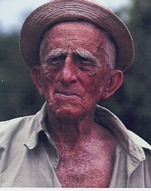The Other Adamson: Terence, Brother of the More Famous George
We hear a great deal about George Adamson, of Born Free fame, but he had an extraordinary brother, whose life needs celebrating. The Adamson brothers, George and Terence, came to Kenya with their parents, Henry Graham Adamson and Katherine, after World War 1. ‘Harry’ Adamson, a small, adventurous man, had been in the Royal Navy and then worked in India, on an indigo plantation, and that is where his sons were born. They were sent to school in England but in the 1920s joined their parents in Kenya on the small coffee plantation in Limuru taken up by Harry. The farm was not a great success and Harry died of a heart attack in 1928. This so distressed Katherine that she took to drink and towards the end of her life her precarious mental health declined even further. She was regarded as slightly batty and called the ‘Countess of Kildare’ by her neighbours. She was hardly ever visited by George and it was left to her other son, Terence, to look after her. She died in 1950.
In World War 2 Terence joined the army and the most well known story about him concerned the cheap suit given to him by the military when he was demobbed. Owning no other formal clothes, Terence buried the suit in an airtight can on his property, digging it up years later when he made his only overseas trip. When he returned home he put the suit back in the can and reburied it. Terence became one of Kenya’s great ‘odd job’ men, and a lot of what exists today would not have been built without him. He was a road, dam, airstrip and bridge builder and was often employed at Marsabit building pipelines and houses. One of his jobs was to control the game that wandered into Marsabit, where he lived in a little house. One resident remembers: ‘One night, on hearing thumps outside his house, he looked out to see several large buffalo in his front garden. He dashed inside to get his .470 double and his torch, put on his kikoi (a traditional wrap) and then hurried out again to find the buffalo. Creeping through the garden he got as far as the road where his torch spotlighted one large buffalo quite near. As he fired, it lurched and ran up the road with Terence in hot pursuit, quite oblivious that his kikoi had fallen off at the shot and he was now quite naked. He found the buffalo dead up the road and then had the job of returning home dressed only in his huge .470 (he is not a big man) before people started coming out to see what the rumpus was about.’
Terence was a small, wiry, strong, intelligent man, with great endurance and courage. He was a solitary man, full of mannerisms, uncomfortable with women, although he fathered more than one son by an African woman. John MacDonald, the vet, said of Terence: ‘He was the sort of chap you could put under a thorn tree in the middle of Africa with no food or water and he would survive. But put him in front of a female and he was terrified. He was desperately shy and never raised his eyes when talking to a woman.’ He lived life as a stubbornly teetotal hermit. This did not assist him when he invested his savings in a hotel, scaring away his customers with ‘Another whisky? Good God, man, think what it does to your stomach lining!’ In 1950 he was a newly appointed locust officer, and then he became game warden in the Isiolo area. He was extremely knowledgeable about the local plants and wild animals and knew how to keep out of danger, even though he lived rough, with a blanket on the ground at night.

In old age Terence decided to emigrate to South Africa, but found himself so out of place that he went back to Kenya and lived with his brother George at Kora, looked after by Tony FitzJohn. He was bitten in the face by one of George’s lions in 1980 (prompting the Kenya Government to shut down George’s work) and bore the scars till his death in 1986. He was buried at Kora and lies beside his brother George who was laid to rest there two years later.
With thanks to Peter Ayre’s East African Biographical Database which is to be put on the internet in due course.
www.csnicholls.co.uk

Recent Comments